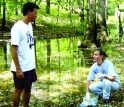|

Press Release 04-142
NSF Awards $37.2 Million in Grants to Study Biocomplexity in the Environment


Salt marshes are among the most productive systems in the world and play a critical role in the ...
Credit and Larger Version |
October 14, 2004
Arlington, Va.—To better understand the interrelationships among living things from molecular structures to genes to ecosystems—and how they interact with their environment—the National Science Foundation (NSF) has awarded $37.2 million in 38 research grants to scientists and engineers across the country.
"These investigations will provide a more complete understanding of natural processes and cycles, of human behaviors and decisions in the natural world, and of ways to use new technology effectively to observe the environment and sustain the diversity of life on Earth," said Margaret Leinen, assistant director of NSF for geosciences and coordinator of NSF’s environmental research and education programs. By placing biocomplexity studies in an environmental context, Leinen believes, "this effort emphasizes research on developing the people, tools and ideas necessary to understand these interconnections, which are often difficult to tease apart."
Research on Biocomplexity in the Environment, said Leinen, will shed light on connections that are not necessarily straightforward or easily discerned, but that are critically important to the future of life on our planet. "Breakthroughs in fields from particle physics to genetics, and advances in computational science, information technology and sensor development, are creating a need for new ideas and tools," said Leinen.
A systems approach is the cornerstone of biocomplexity studies, says Leinen. Scientists and engineers must work in teams across diverse fields that go beyond biology to include physics, engineering, economics, geochemistry and others, on studies that extend from the molecular level to mass changes in climate with potential for worldwide impact. "We now have powerful new technologies and tools that make this kind of research possible," said Leinen.
NSF's Special Competition in Biocomplexity in the Environment: 2004, is the fifth year of a multi-year effort. Five subcategories of awards were made: Dynamics of Coupled Natural and Human Systems (CNH), with nine awards totaling $9.4 million; Coupled Biogeochemical Cycles (CBC), with seven awards totaling $7.0 million; Genome-Enabled Environmental Science and Engineering (GENEN), with eight awards totaling $7.0 million; Instrumentation Development for Environmental Activities (IDEA), with five awards totaling $5.5 million, and Materials Use: Science, Engineering, and Society (MUSES), with nine awards totaling $6.6 million.
Research projects in the CNH sub-category include studies of biocomplexity and changing fisheries sustainability; feedbacks among forestry, agriculture and fire in Amazonia; and interactions among human, biological and physical processes in large lake ecosystems.
In the CBC sub-category, scientists will investigate such subjects as biogeochemical cycling of heavy metals in Lake Coeur d'Alene sediments; vegetation changes after nitrogen deposition in southern California ecosystems; and changes in biogeochemical cycles accompanying early animal evolution.
In GENEN, scientists will engage in such projects as developing genomic approaches to understanding variation in marine larval recruitment; undertaking genomic analyses of natural populations of pathogens on natural hosts; and understanding the mechanisms responsible for persistence of microorganisms in drinking water systems.
IDEA grantees will conduct research on development of sensor arrays for acoustic monitoring of bird behavior; development of ship-borne atmosphere-ocean ozone flux measurements; and designing probes for ecological and soil hydrological monitoring of plant root zones, among others.
MUSES investigators will study the natural and industrial ecology of bio-based products; bridging the disposable/reusable divide in health protective textiles; and the impact of transportation alternative fuels and powerplant systems on the environment and on society.
For a complete list of research projects, please see:
http://www.nsf.gov/geo/ere/ereweb/fund-biocomplex.cfm
-NSF-
FACT SHEET:
Biocomplexity in the Environment

Media Contacts
Cheryl Dybas, NSF (703) 292-7734 cdybas@nsf.gov
Program Contacts
David Campbell, NSF (703) 292-8002 dcampbel@nsf.gov

The National Science Foundation (NSF) is an independent federal agency that supports fundamental research and education across all fields of science and engineering. In fiscal year (FY) 2009, its budget is $9.5 billion, which includes $3.0 billion provided through the American Recovery and Reinvestment Act. NSF funds reach all 50 states through grants to over 1,900 universities and institutions. Each year, NSF receives about 44,400 competitive requests for funding, and makes over 11,500 new funding awards. NSF also awards over $400 million in professional and service contracts yearly.
 Get News Updates by Email Get News Updates by Email
Useful NSF Web Sites:
NSF Home Page: http://www.nsf.gov
NSF News: http://www.nsf.gov/news/
For the News Media: http://www.nsf.gov/news/newsroom.jsp
Science and Engineering Statistics: http://www.nsf.gov/statistics/
Awards Searches: http://www.nsf.gov/awardsearch/
| 


